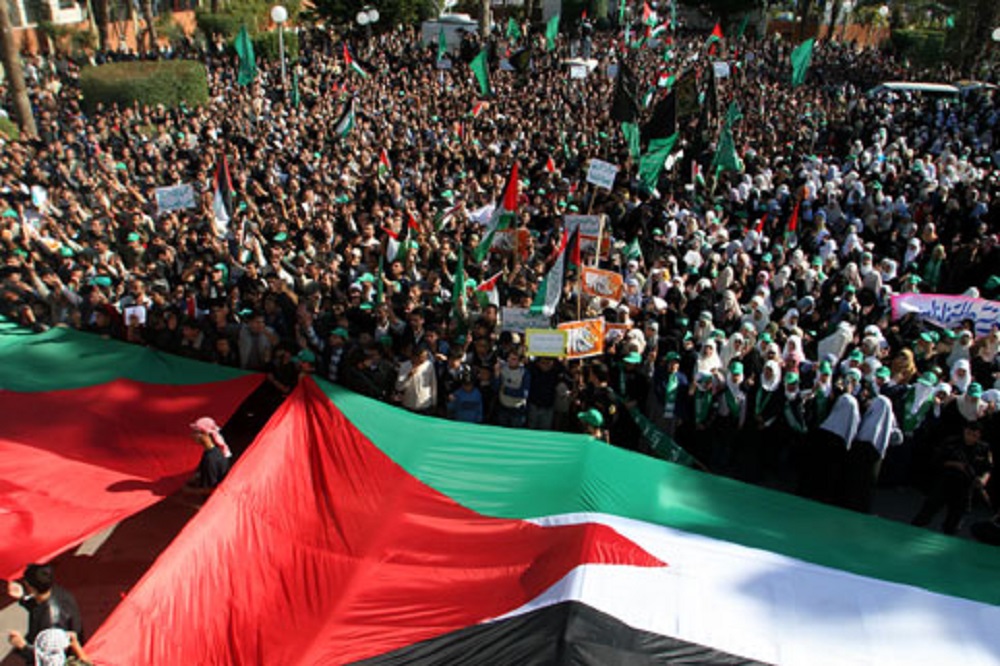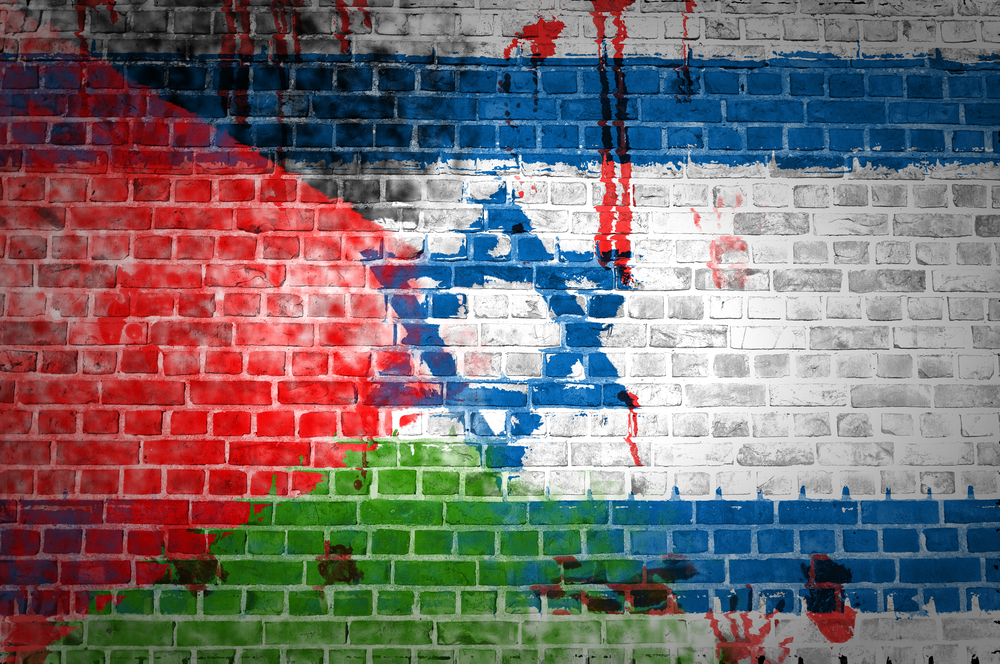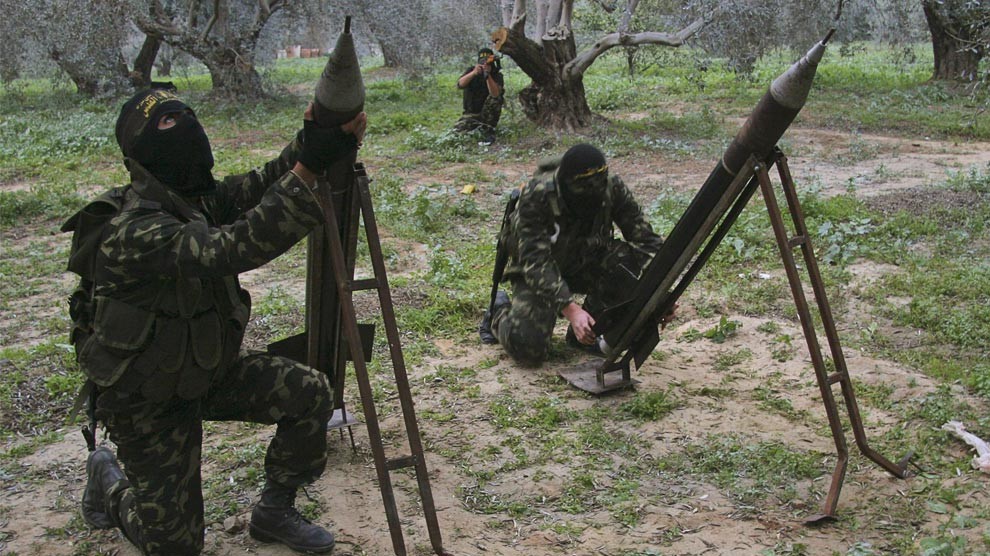Next Steps in the Middle East
In November 2003 (and on many occasions since then), Hamas leader Mahmoud al-Zahar set out the reality under which Israel continues to live: “We do not recognize the State of Israel or its right to control any of the land of Palestine. Palestine is holy Islamic land. Our national problem is not related only to the West Bank, Gaza, and al-Quds (Jerusalem)…but to Palestine, all [the territory of] Palestine”, and Hamas’s recent pact with the Palestinian Authority will not change this. If anything, it brings Hamas closer to achieving it’s goal.
So far as Hamas is concerned, the battle will continue until Israel is destroyed, even if that takes decades. It’s founding charter calls for “the reinstitution of the Muslim state … Allah is its goal, the Prophet its model, the Qur’an its Constitution, Jihad its path and death for the cause of Allah its most sublime belief.”
And al-Zahar is not alone in this thinking. In a December 2008 poll, Palestinians were asked: “Do you support or oppose suicide bombings against Israeli civilians?” 56% said they supported it. This poll paralleled the results of an earlier survey conducted jointly by Public Opinion Research of Israel and the Palestinian Center for Public Opinion which found that only 13% of Palestinians agreed with the statement that “Hamas was a terrorist group”; 82% agreed that Hamas was a “freedom-fighting organization”; and a mere 10% believed that bombings targeting Israeli civilians in buses and restaurants could be classified as “acts of terrorism.”
More recently, among six predominantly Muslim nations surveyed by the Pew Research Center’s Global Attitudes Project, Osama bin Laden received his highest level of support (34%) among Muslims in the Palestinian territories – far greater than in Indonesia, Egypt, Jordan, Turkey or Lebanon. The same percentage of Palestinians questioned in a joint Hebrew University-Palestinian think-tank poll openly supported the murder of the Fogel family. Along these same lines, the world may have been appalled by the March 2008 terrorist attack in a Jewish religious school in West Jerusalem, but in a poll conducted immediately thereafter by the Palestinian Center for Policy and Survey Research, 84% of Palestinians approved of it. This pathology was encapsulated by Hakim Awad and Amjad Fawzi from the West Bank village of Awarta, the accused murderers of the Fogel family. In their confessions, they stated they were motivated by “a desire to kill Jews” and “die as martyrs”. Not only did they express no remorse, but they confessed that had they known there were two more children sleeping in the house, they too would have been murdered.
Such attitudes emphasize the enormous ethical and moral divide separating Palestinian and Israeli societies. What the Obama Administration and the Europeans fail to understand — or pretend not to understand — is that Hamas was elected in 2006 because its very rationale for existence — the destruction of Israel as a Jewish state – – reflects the prevailing attitude of mainstream Palestinian society. For the Palestinians, terrorism is not a weapon borne of desperation or poverty; it is a strategic choice.
Military historian Victor Davis Hanson of the Hoover Institution has written extensively on this subject. “Modern Western man” he wrote, “is faced with an awful dilemma, from which he recoils: Real peace and successful reconstruction are in direct proportion to the degree to which an enemy is humiliatingly defeated and acknowledges it – the aim being that he will come to feel that he cannot go on being what he has been.”
That moment is reached when an enemy is rendered incapable of and unwilling to continue the conflict; only then can an enemy’s terror apparatus be dismantled (as was the case of the Tamil Tigers in Sri Lanka and the FARC in Columbia); its leadership replaced, its capacity to wage further war eliminated; its weapons seized; its militias hunted down; its propaganda machine terminated; its educational system reformed; its human and financial resources channeled into massive social and economic reconstruction, its government and judiciary made transparent, and its population prepared for a future of building rather than destroying. If his historical analysis is correct, neither Israel nor the US will be able to accommodate — or moderate — an ideologically-driven enemy, be it Iran or any of its its Middle East proxies whose divinely-inspired mission is to conquer Israel (for starters) and compel its citizens to submit to Islam.
Faced with a choice between annihilation and survival, the Israelis will choose survival. For post-modern children of the Enlightenment, the idea that we would ever have to destroy our enemies to ensure our survival is deeply disturbing. War is neither pleasant nor desirable, but in an environment where a society educates its population virtually from birth to define Jews as the descendants of pigs and apes and to revere suicide bombers as “martyrs,” where Palestinian mothers celebrate the “martyrdom” of their children, name town squares, sports tournaments and theater performances after them, and where Palestinians are taught a culture of death in their kindergartens, children’s TV programs, textbooks, schools, summer camps, mosques, marketplaces, video games and on the Internet [see www.palwatch.org], war becomes a necessary response to a culture that spawns such religiously-sanctioned murder.
In their time, great generals like Eisenhower and Patton were driven by a concept rarely heard or spoken of these days by Western powers, although referred to incessantly by our enemies – absolute victory. During World War II, these leaders understood that it would be impossible to end Japanese militarism in the Far East and to dismantle the Hitler Youth, the Nazi SS, the death camps, the cult of Aryan supremacy and Nazi aggression without the complete destruction of the Third Reich. Only such destruction permitted the re-birth of a new Germany and Japan — and even then it took seven years before Adenauer came to power. Today, the belief that genocidal, messianic regimes like Iran or Hamas can be bribed or cajoled into overturning the reasons for their existence flies in the face of history.
Eventually, a point will be reached when Operation Cast Lead II will be required and Palestinian society will be forced to undergo a profound metamorphosis that will sweep away the culture of “martyrdom” and religiously-inspired genocide and sow the political, social, educational, cultural and economic seeds for a new tomorrow. This will not be achieved by forcing the Israelis to concede Palestinian statehood to terrorists, relinquishing the Golan Heights to Syria, returning the Sheba ‘a Farms area to Hezbollah-controlled Lebanon, dividing Jerusalem so that it could be taken over the next day by a new hostile or failed state, rectifying Israel’s borders, or settling on a refugee compensation formula – at least, not at present. Real peace will be achieved only after the Palestinians have been brought to the realization that their dream of conquering Israel is futile, and that whatever the future holds for them, it will be far better than the war they have brought upon themselves.
The US administration and the Europeans are misguided in believing that there is “no military solution” to the problems caused by Iran, Hamas and Hezbollah throughout the Middle East. Multicultural tolerance, appeasement, concessions, and utopian pacifism do not work well against radical Islamists because when one speaks and acts for Allah, there can be no compromise. Conflict-resolution theory taught in our universities and the belief that disagreements between nations are not really the result of evil actions or incompatible worldviews but simply misunderstandings requiring an analysis of the “root causes of their grievances” that can be rectified through dialogue and reason will not resolve the “problem” these Islamists see in Israel’s existence. Michael Ledeen of the Foundation for Defense of Democracies said it very well several years ago: “Peace cannot be accomplished simply because some visiting envoy, with or without an advanced degree in negotiating from the Harvard Business School, sits everyone down around a table so they can all reason together.”
If the Palestinians continue to promote their culture of martyrdom, fail to fulfill their obligations under the Oslo Accords, and continue to commit war crimes against the Israeli people and their own as well – from sending suicide bombers into Israel, to firing anti-tank missiles at school buses, to slaughtering a Jewish family while they slept, to firing missiles into Israel’s population centers and using their own people as human shields for propaganda purposes, Israel will be forced to re-occupy Gaza and the West Bank, and return to its pre-Oslo military administration.1 Over time, Palestinian society will be re-structured and rebuilt under the governance of a new generation of moderate Palestinian leaders. These leaders will do away with the pathologies that currently plague their society and they will establish a state that can take its rightful place in the family of nations. In the final analysis, the imaginary rewards of “martyrdom” and the culture that spawns it must be removed. Anything short of this will merely prolong the conflict; delay reconstruction; sow the seeds for future conflict, and render a peaceful Middle East impossible.
ENDNOTE
- For an analysis of Palestinian life under the pre-Oslo Israeli military administration, see Efraim Karsh, “What Occupation?” Commentary, July/August 2002.




